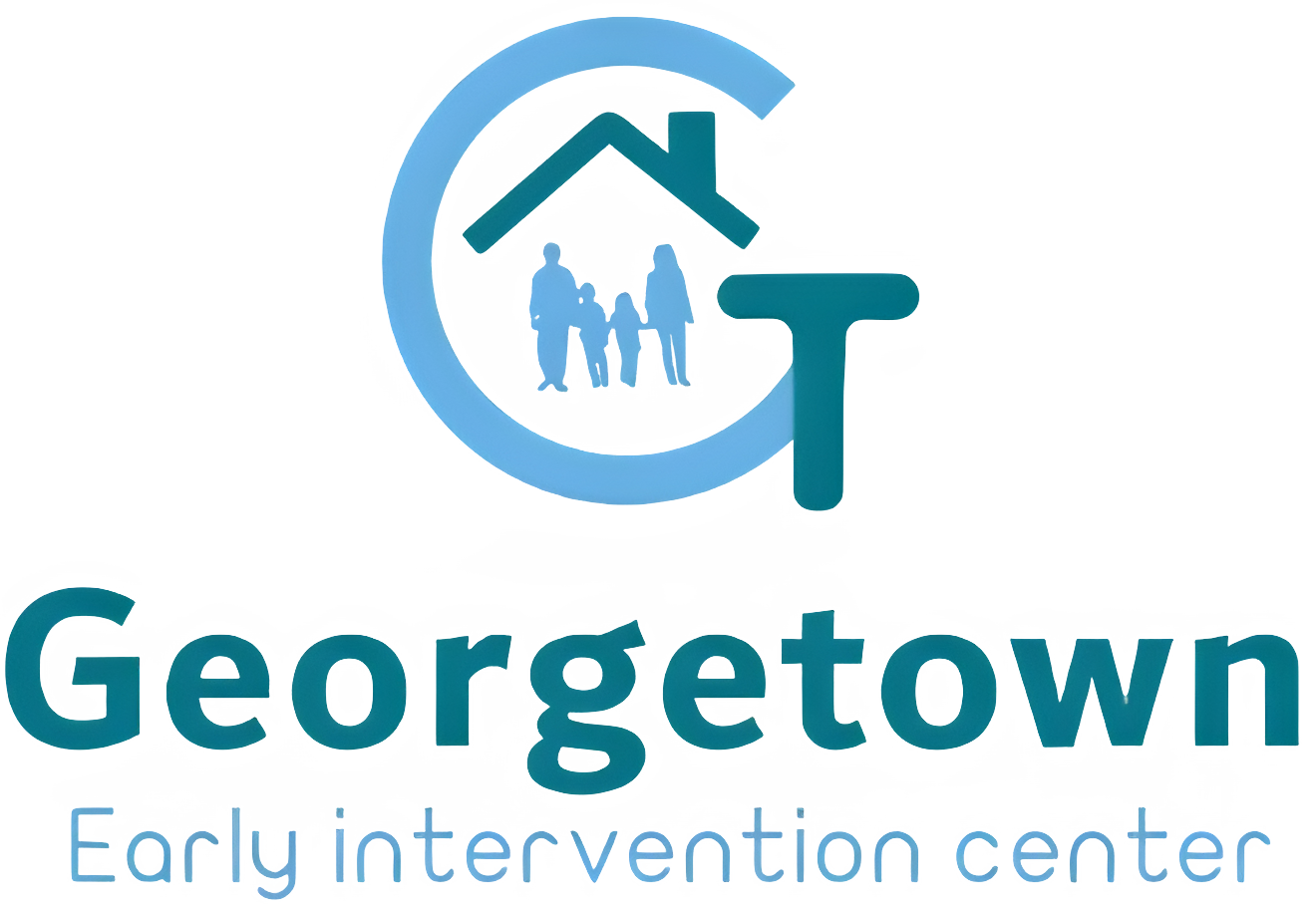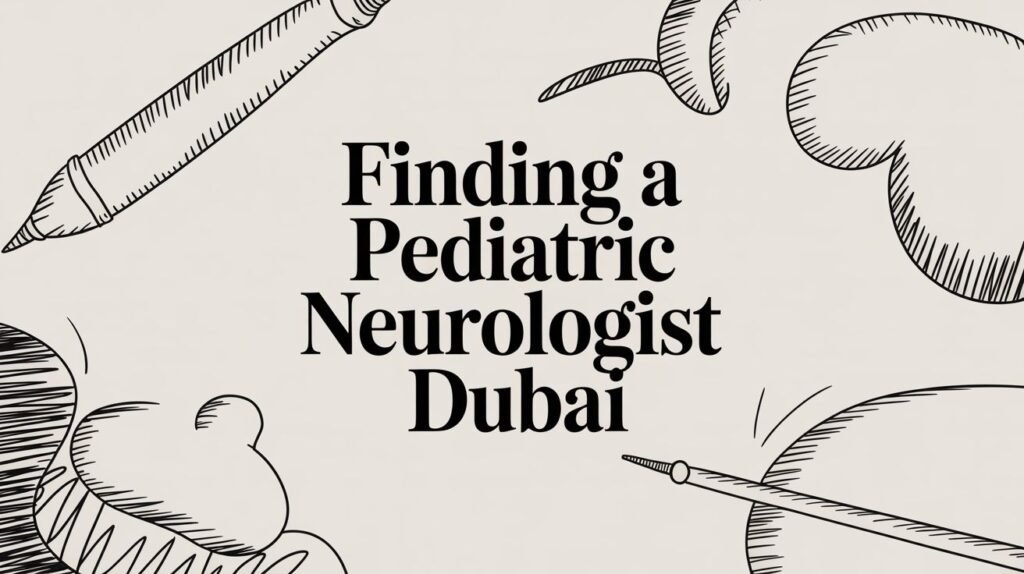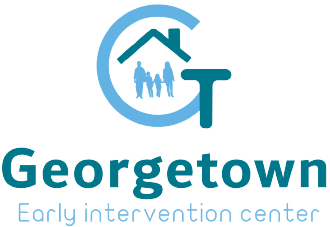Navigating your child's neurological health can feel overwhelming, but finding the right specialist in Dubai is the most critical first step. This guide is here to bring clarity and confidence to your journey, offering a clear, empathetic roadmap for families looking for the best pediatric neurologist Dubai can provide.
Understanding Your Child’s Neurological Journey
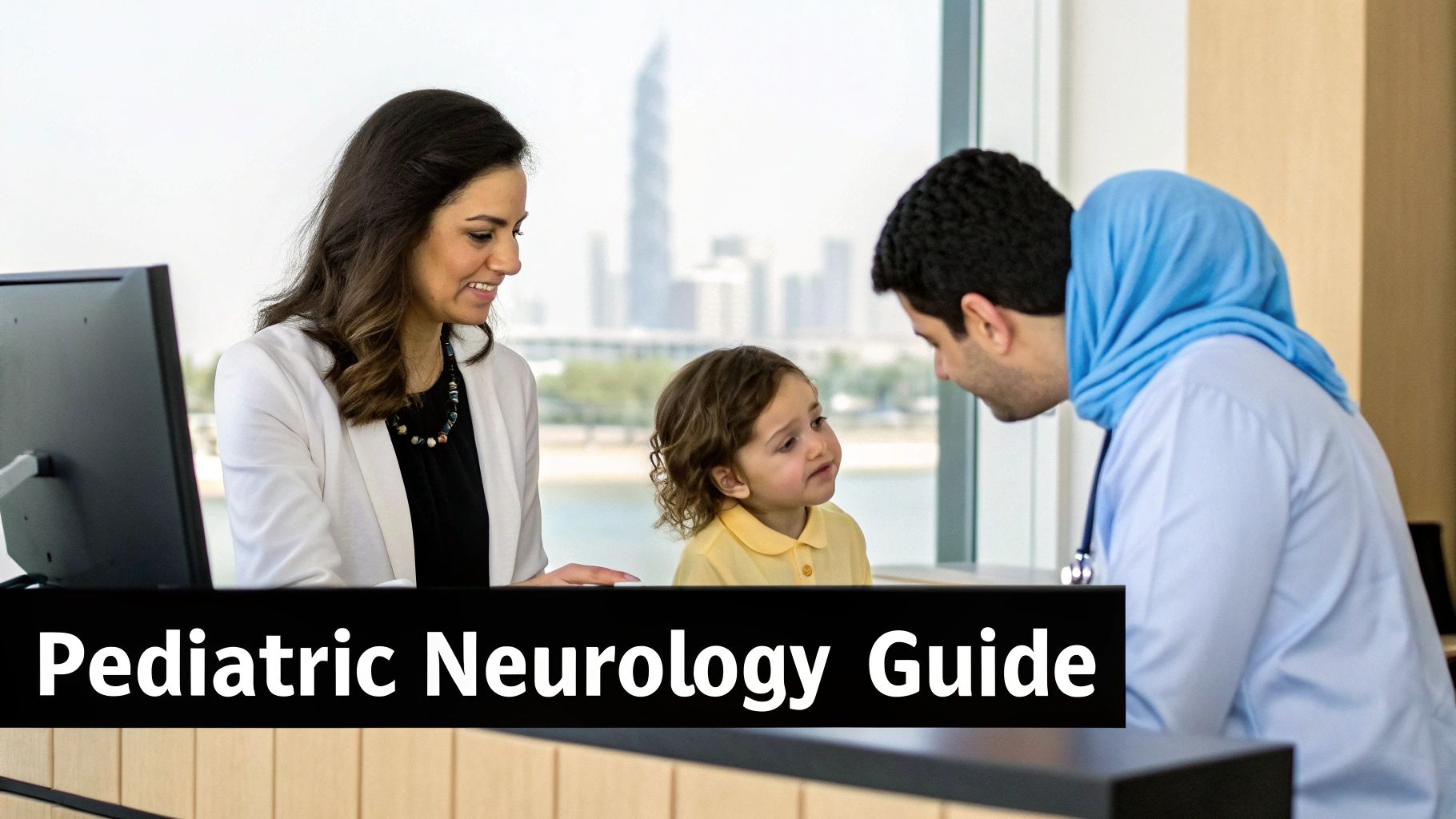
When you have concerns about your child's development, every piece of information feels vital. Think of this guide as your comprehensive resource, designed to break down the complex world of pediatric neurology into understandable and actionable steps. We'll explore the essential role of a pediatric neurologist—a highly specialised doctor focused on a child's developing brain, spine, and nervous system.
A child’s nervous system isn’t just a smaller version of an adult's; it's a dynamic, rapidly growing network. This unique growth process requires a specialist who truly understands the milestones and potential challenges that can arise from infancy all the way through adolescence.
What This Guide Covers
Our goal is simple: to give you the knowledge you need to move forward with confidence. We’ve structured this guide to build your understanding from the ground up, covering everything you need to know.
- Defining the Specialist's Role: We’ll clarify what a pediatric neurologist actually does and how their expertise is different from a general pediatrician or an adult neurologist.
- Recognising Key Signs: You'll learn to identify the specific symptoms and developmental red flags that mean it's time for a specialist consultation.
- Navigating the Appointment: We'll demystify the diagnostic process, explaining what to expect during your first visit and the purpose of common tests you might encounter.
- Choosing the Right Doctor: Get practical, real-world advice on how to evaluate and select the best pediatric neurologist in Dubai for your family's unique needs.
Think of this guide as a trusted partner on your journey. It’s designed to transform uncertainty into empowerment, helping you make informed decisions for your child’s health and well-being.
Ultimately, seeking the expertise of a pediatric neurologist is a proactive step toward ensuring your child gets the precise care they need. From understanding concerning symptoms to knowing what questions to ask, this guide will provide the clarity and support your family deserves.
What a Pediatric Neurologist Actually Does
Think of a pediatric neurologist as a highly specialized detective for your child's developing nervous system. Their job is fundamentally different from a general pediatrician or an adult neurologist, and for a simple reason: a child's brain isn't just a smaller version of an adult's. It's a dynamic, rapidly growing organ that demands a completely unique understanding.
A pediatric neurologist in Dubai has deep knowledge of the intricate developmental stages from infancy all the way through adolescence. They are trained to diagnose, treat, and manage conditions affecting the brain, spinal cord, nerves, and muscles—all within the context of a growing child.
A Focus on Development and Growth
Unlike adult neurologists who treat nervous systems that are already fully formed, pediatric specialists zero in on disorders that can get in the way of a child's normal development. Their expertise is in figuring out how a neurological condition might impact learning, behavior, and the ability to pick up new skills. This requires a totally different diagnostic lens and treatment playbook.
They assess everything from a baby’s muscle tone and reflexes to a teenager's complex coordination and cognitive abilities. Their work is absolutely crucial for catching issues early on, when interventions can make the biggest possible difference in a child's life.
Conditions a Pediatric Neurologist Manages
The scope of their work is incredibly broad, covering a huge range of conditions that can show up in childhood. They are the go-to specialists for evaluating and treating many complex issues.
- Epilepsy and Seizure Disorders: This involves diagnosing all types of seizures—from dramatic convulsions to subtle staring spells—and creating plans to manage and control them.
- Developmental Delays: When a child isn't hitting milestones like sitting, walking, or talking on time, a pediatric neurologist digs in to find potential neurological causes.
- Cerebral Palsy: They manage this group of movement disorders, helping to improve motor skills and overall quality of life with coordinated therapies.
- Severe Headaches and Migraines: For children with recurring or debilitating headaches, these specialists can pinpoint the cause and offer effective treatments.
A huge part of their role is separating typical childhood behaviors from symptoms of a genuine neurological disorder. Their specialized training helps them see patterns others might miss, leading to an accurate diagnosis and timely care.
Their work also covers a wide spectrum of other issues. They diagnose and manage neurodevelopmental challenges, including but not limited to, conditions like ADHD. Their expertise extends to neurogenetic disorders like Rett syndrome or muscular dystrophy, where they help manage symptoms and support families. They also play a key role in assessing children with Autism Spectrum Disorder (ASD), addressing related neurological challenges like sleep disturbances or seizures. This dedicated focus ensures every child gets a precise, age-appropriate treatment plan built just for them.
Recognizing Signs That Warrant a Specialist Visit
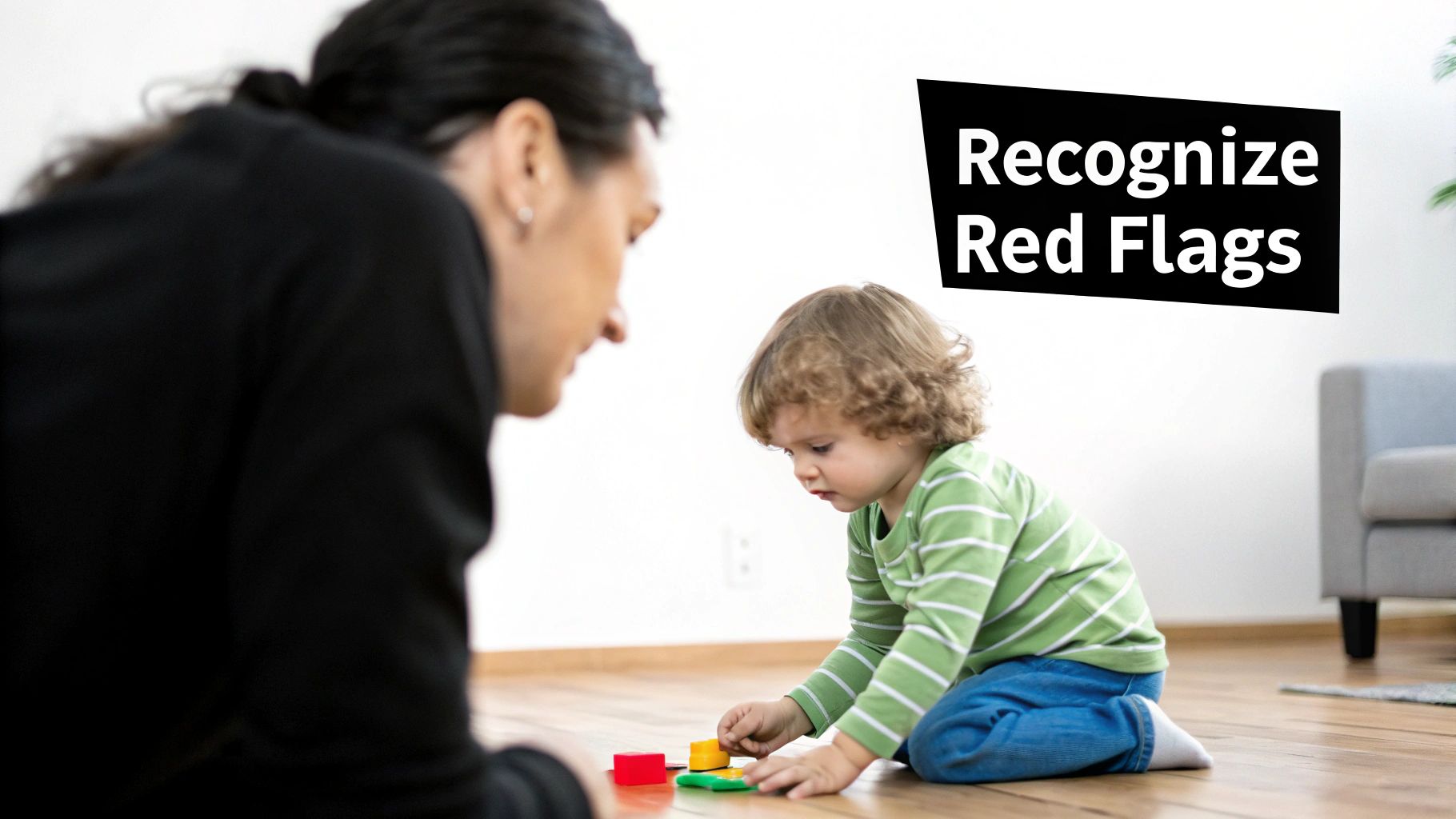
As a parent, you're the world’s leading expert on your child. You know their quirks, celebrate their small victories, and just sense when something isn’t quite right. But it can be tough to distinguish between a typical developmental phase and a genuine reason for concern.
Deciding to consult a pediatric neurologist in Dubai is a big step. Knowing which signs to look for can empower you to act with confidence. The key isn't to focus on isolated incidents but to observe persistent patterns that feel out of the ordinary.
Developmental Delays and Milestones
One of the most common reasons parents first seek a specialist is a feeling that their child is consistently missing key developmental milestones. While every child absolutely develops at their own unique pace, significant lags can sometimes point to an underlying neurological issue that would benefit from early attention.
Keep an eye on these key areas:
- Motor Skills: Delays in sitting up, crawling, or walking. You might also notice a struggle with fine motor tasks, like gripping a crayon or picking up small objects.
- Speech and Language: Not babbling by 12 months, not using single words by 16 months, or having a hard time putting simple sentences together later on.
- Social and Cognitive Skills: A lack of smiling or limited eye contact, or not responding when you call their name.
If you’re feeling concerned, it can be helpful to understand what constitutes a developmental delay so you can better articulate your observations to a medical professional.
Physical and Behavioural Red Flags
Beyond developmental milestones, certain physical symptoms and behavioural changes can also signal the need for an expert evaluation. These signs often point more directly to how the nervous system is functioning.
It's not about looking for problems, but about being attuned to patterns. A single clumsy day is normal; persistent balance issues or a sudden loss of coordination is a reason to seek advice.
Pay close attention to these particular indicators:
- Unusual Headaches: These aren't just typical headaches. We're talking about ones that are severe, happen frequently, wake your child from sleep, or are accompanied by vomiting.
- Seizure-Like Activity: This can include obvious convulsions, but also much more subtle signs like prolonged staring spells, sudden and repeated muscle jerks, or brief moments of unresponsiveness.
- Motor Function Issues: Noticeable muscle weakness or stiffness, tremors you can't explain, unusual clumsiness, or a sudden change in how your child walks.
- Sensory Sensitivities: Extreme reactions to everyday sounds, textures, or lights can sometimes be linked to neurological conditions. For many parents, learning about Sensory Processing Disorder is what first leads them to a pediatric neurologist.
Ultimately, you have to trust your intuition. If your gut tells you something is off, start documenting your observations. Scheduling a consultation with a specialist is the most proactive and supportive step you can take for your child's well-being.
What to Expect During Your Child's Appointment
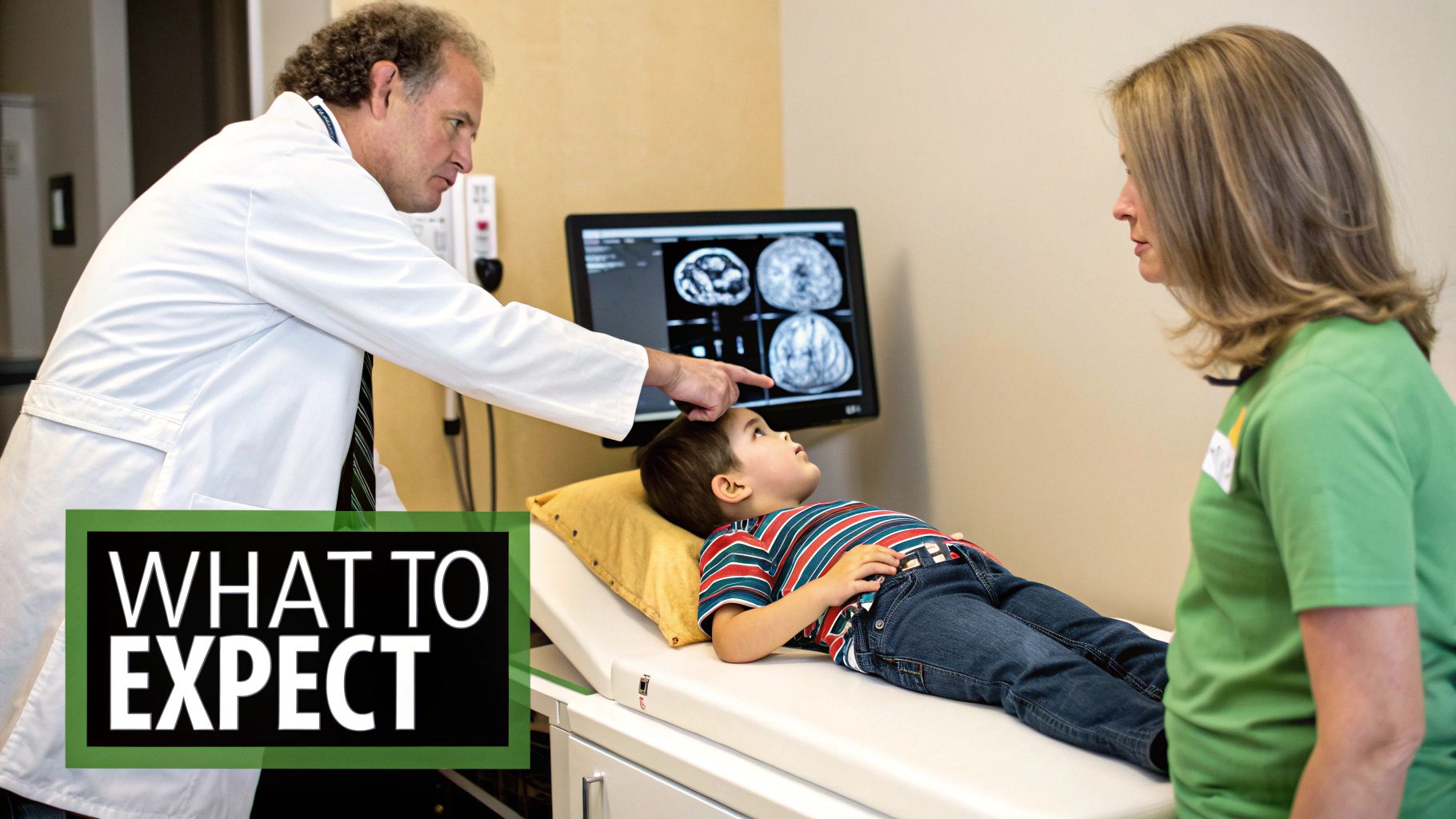
Walking into a specialist's office for the first time can feel overwhelming, especially when you're worried about your child's well-being. Knowing what to expect can ease a lot of that anxiety and help you feel more prepared to be an active partner in their care.
The first visit with a pediatric neurologist in Dubai is all about gathering information. Think of it less like a test and more like a detailed conversation where you and the doctor work together to build a complete picture of your child's health.
The Initial Examination and Discussion
The appointment will kick off with a deep dive into your child's history. The neurologist will ask about everything—from your pregnancy and their birth to current developmental milestones, behaviours, and the specific symptoms that brought you in. It might feel like a lot of questions, but each answer is a valuable clue.
After you've talked, the neurologist will perform a physical and neurological exam. This is designed to be very gentle and is often made to feel like a game for your child. The doctor will check things like reflexes, muscle strength, balance, coordination, and even head size.
This hands-on assessment allows the specialist to see your child's nervous system in action, looking for subtle signs that can point toward an underlying cause for your concerns. It’s a crucial piece of the puzzle and part of the broader comprehensive assessment services in Dubai that help create a full diagnostic picture.
Your observations as a parent are the most important part of this visit. Before you go, jot down notes about specific behaviours, symptoms, or delays you've noticed. No detail is too small to share.
Demystifying Common Diagnostic Tools
Sometimes, the initial exam suggests that a closer look is needed. If that's the case, your pediatric neurologist might recommend certain diagnostic tests to get a clearer view of what's happening inside your child’s brain or nervous system. This isn't a cause for immediate alarm; it's just the next logical step in getting precise answers.
Here’s a quick rundown of some common tools a neurologist might use to get more information.
| Understanding Common Diagnostic Tools | ||
|---|---|---|
| Diagnostic Tool | What It Measures | What the Test Feels Like |
| Electroencephalogram (EEG) | It measures the brain's electrical activity (brain waves). Think of it like an EKG for the brain. | Completely painless. Small sensors are placed on the scalp with a special paste. Your child may be asked to rest, look at flashing lights, or breathe deeply. |
| Magnetic Resonance Imaging (MRI) | It uses a powerful magnet and radio waves to create detailed, 3D pictures of the brain and spinal cord. | Lying still inside a tube-like machine. It can be quite loud, so headphones are provided. For young children, sedation is often used to ensure they stay still. |
These tests may sound complicated, but they are routine procedures that provide incredible insight. They help ensure the diagnosis is as accurate as possible, which is the foundation for creating an effective treatment plan for everything from epilepsy to cerebral palsy. Top-tier pediatric neurology services in Dubai are well-equipped with these technologies to provide the highest standard of care.
How to Choose the Right Pediatric Neurologist in Dubai
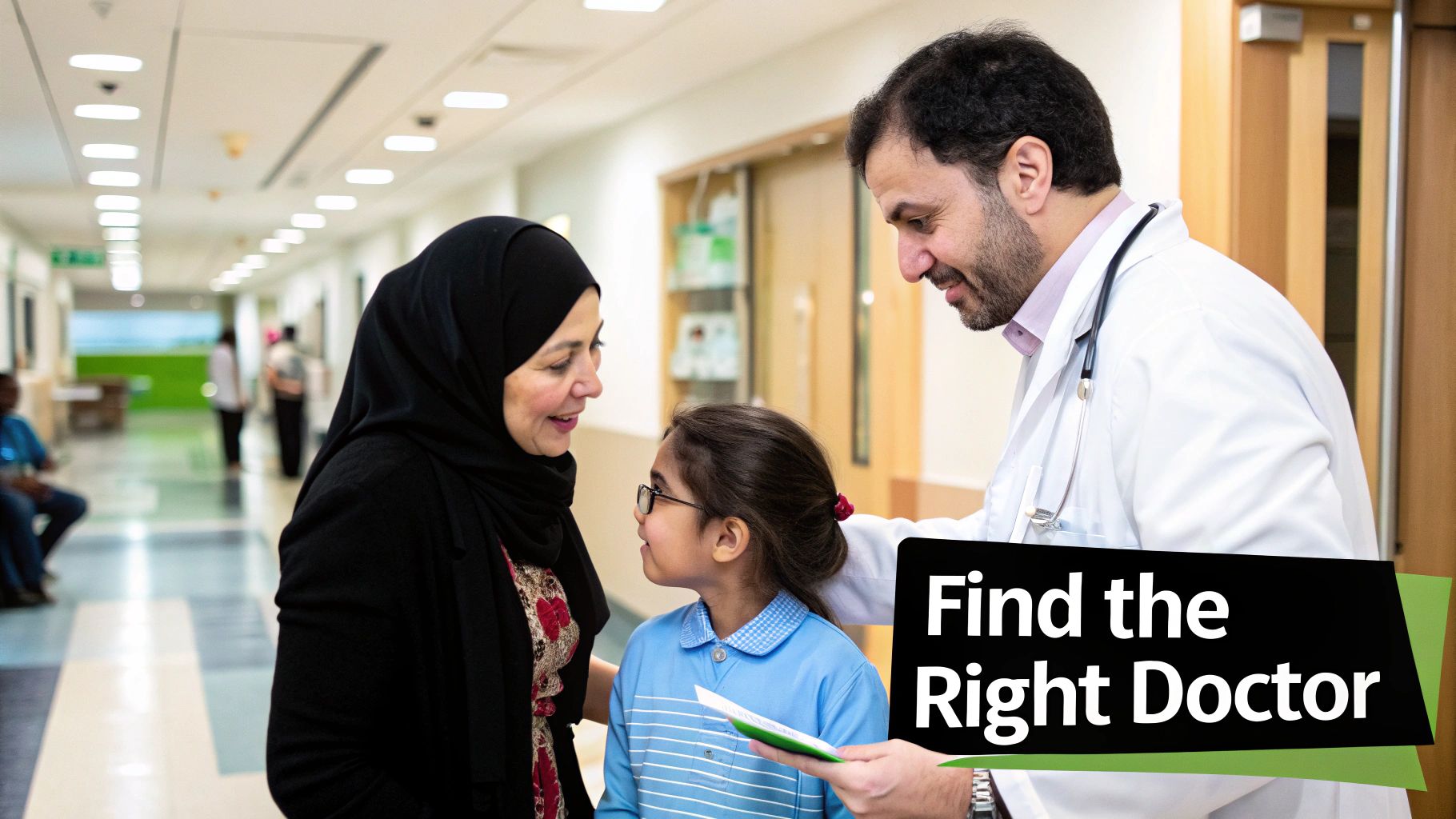
Finding the right doctor for your child isn’t just about credentials. It’s about finding a true partner for your family's journey. When you need a pediatric neurologist in Dubai, you're looking for someone who blends deep medical knowledge with a compassionate approach—someone who makes both you and your child feel safe, understood, and heard.
This is a big decision. This specialist will become a central figure in managing your child’s health, and a great partnership is built on trust, clear communication, and a shared commitment to your child’s well-being. It’s best to approach your search with a clear framework in mind.
Key Factors to Consider in Your Search
Start by looking into a doctor's specific areas of expertise. While all pediatric neurologists are highly skilled, some develop a special focus on conditions like epilepsy, neuromuscular disorders, or complex neurogenetic conditions. If your child has a preliminary diagnosis or specific symptoms, finding a specialist with deep experience in that particular area can make a world of difference.
Also, take a look at the specialist’s hospital affiliations and the resources available at their clinic. A well-integrated care system often means smoother access to diagnostic tests and other specialists when you need them.
In the UAE, for example, pediatric neurologists are essential in managing complex issues like neonatal seizures. Their expertise is crucial, with a study showing that specialists in Dubai (64%) and Abu Dhabi (22%) were key figures in establishing clinical guidelines for newborn care. You can read the full research about neonatal seizure management to see just how structured the approaches are in the region.
The right neurologist doesn't just treat a condition; they treat your child. Look for a professional who speaks directly to your child in an age-appropriate way and listens patiently to your parental concerns.
The Value of a Team Approach
Modern neurological care is rarely a one-person show. The very best outcomes usually come from a multidisciplinary team, where your neurologist works closely with other professionals. This kind of integrated team can provide a full spectrum of support that’s perfectly tailored to your child’s needs.
Your care team might include:
- Therapists: Occupational, speech, and physical therapists who help build essential life skills.
- Educational Psychologists: Specialists who can address learning challenges and support your child's academic journey.
- Behavioural Therapists: Professionals who provide strategies to manage behavioural issues that may accompany a neurological condition.
This collaborative model ensures every aspect of your child’s development is supported. As you research, don't hesitate to ask about a clinic's approach to integrated care and meet some of the professionals who form our multidisciplinary team of experts. Finding a doctor who champions this holistic method is a strong sign that your child will receive well-rounded and effective support.
Dubai has quickly become a major destination for advanced medical care, and that's especially true in the world of pediatric neurology. Families in the region no longer have to think about traveling abroad for top-tier specialized treatments. When you seek out a pediatric neurologist in Dubai, you're connecting with a network of highly skilled professionals who are truly at the forefront of their field.
This environment means our children have access to some of the most cutting-edge diagnostics and therapies available today. For kids with complex conditions, this translates into more accurate diagnoses and treatment plans tailored specifically to their unique neurological needs. The entire approach is shifting from just managing symptoms to getting to the root cause of these disorders.
Pioneering Fields in Dubai
One of the most exciting areas of growth right now is neurogenetics, a field focused on uncovering the genetic origins of neurological conditions. By pinpointing the exact genetic markers behind a disorder, specialists can offer families a much clearer prognosis and develop highly targeted interventions. This is a game-changer for rare conditions like Rett syndrome or muscular dystrophy.
On top of that, clinics across Dubai offer sophisticated management programs for complex pediatric epilepsy. These programs go far beyond standard medication. They often involve advanced diagnostic tools like video-EEG monitoring and even explore therapies like specialized diets to help control seizures and dramatically improve a child's quality of life.
Dubai is actively building an ecosystem of neurological innovation. By hosting major medical events and attracting global experts, the city ensures that local patients receive care that reflects the very latest international standards and research.
This commitment is undeniable as Dubai establishes itself as a regional hub for pediatric neurogenetics. The upcoming 2nd MENA Congress for Neurogenetic Disorders, set for October 2025, is a testament to this, building on the success of its first event which drew over 200 participants, including dozens of international experts. The fact that more than 30% of attendees came from outside the UAE speaks volumes about the city's growing role in fostering regional collaboration and research. You can learn more about Dubai's role in neurogenetics research on neurogenetics.ae.
Answering Your Questions About Pediatric Neurology
Stepping into the world of pediatric neurology can feel overwhelming, and it's natural to have a lot of questions. Let's clear up some of the common concerns parents have when they're looking for a pediatric neurologist in Dubai, so you can feel more confident about the journey ahead.
What's the Difference Between a Neurologist and a Psychologist?
Think of it like this: a pediatric neurologist is the "hardware" expert for the brain and nervous system. They are medical doctors who diagnose and treat physical conditions like epilepsy, cerebral palsy, or migraines.
A child psychologist, on the other hand, is the "software" specialist. They focus on mental, emotional, and behavioral health, helping with challenges like anxiety, ADHD, or learning difficulties, usually through therapy. The two often work as a team to give your child the most complete picture of care.
How Should I Prepare My Child for Their First Visit?
The best approach is to keep it simple and positive. You could say something like, "We're going to see a friendly doctor who helps us understand how our amazing brain works." This frames the visit as an interesting check-up, not something to be scared of.
A little practical preparation goes a long way, too:
- Bring a Comfort Item: A favorite toy, book, or tablet can be a lifesaver during wait times.
- Jot Down Your Notes: Before you go, write down all your questions and observations about your child. This way, you won't forget anything important during the appointment.
Your calm energy is contagious. The goal is to make the experience feel as normal and low-stress as possible, and a relaxed parent often helps create a relaxed child.
Are Neurological Conditions Always Permanent?
Not at all. This is a common worry, but the reality is that many conditions are highly manageable, and some children even outgrow them with the right support and time.
For instance, certain types of childhood epilepsy can completely disappear by the teenage years. Other conditions, like migraines, can be managed so well that they barely impact daily life. Every child's situation is unique, and your neurologist will give you a clear and honest outlook based on their specific diagnosis.
